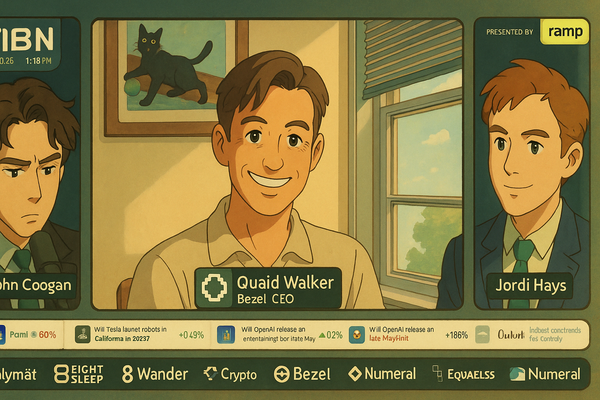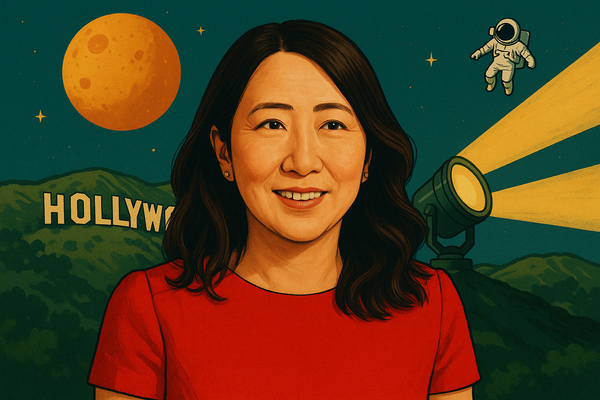Chaotic energy
Spreadsheet energy has diminishing returns

Thanks to Glide, which is a new partner of The Rebooting. We’re kicking off an insights series this week in which Glide CEO Denis Haman will share his expertise about how publishers should think about their tech stacks. Thanks, Denis and Glide.
I wrote today in praise of chaotic energy. It sprang from a conversation we had on this week’s People vs Algorithms podcast about differentiation in media. My belief is we’ll see more of it rewarded in the coming era of synthetic content.

Chaotic energy v spreadsheet energy
People exist on an energy continuum between chaos and spreadsheets. The chaotic energy people gravitate to more creative fields. They’re terrible at deadlines, often messy in their personal and organizational habits, prone to procrastination and malaise, and live their lives with long periods of seeming torpor punctuated by productive bursts that often require arbitrary deadlines to jolt them into action. On the other end of the continuum are the spreadsheet energy people who love nothing more than organization, “running the numbers,” multivariate testing, life hacks and optimization, using Notion and building models that boil down fickle human endeavors into neat rows and cells.
Efficiency is the calling card of spreadsheets. The most successful publishing companies in recent years have excelled at a spreadsheet energy approach to publishing, mastering distribution techniques and optimization that create incremental value. Exponential value isn’t created by pattern matching. That requires going off the beaten path. Microsoft’s vow to eradicate Google’s margins from search will lead to a battle to reimagine the most important node of distribution in digital publishing. The search algorithm is the heartbeat of digital publishing.
We discussed the value of differentiation on this week’s People vs Algorithms podcast. Most digital publishers suffer from the lack of it. The most recent demise of Gawker is a reminder of how bland a lot of digital publishing became after the blogging era. In the scramble to build big audiences in the belief that will result in big businesses, publishers erased their differentiation by trying to be all things to all people, outsourcing their brand strategy to the whims of algorithms. Perception and differentiation don’t show up on spreadsheets. The fleeting engagement of a random click on a search query or in an algorithmic look pretty similar to a deep connection with a person.
Chaotic energy people will end up benefiting from the influx of AI because at its heart, robots are about efficiency. And chaotic energy people are inefficient dreamers. Newsletters are so interesting to me because they point to a different way of recapturing the energy and differentiation of the blogging era to create different types of products, maybe even an artisanal internet. Spreadsheet energy didn’t do such a great job of the last era, so maybe time to give the chaotic energy people a shot.
Publisher business models will be affected by AI, there’s little doubt. But that’s because publishers as businesses have grown into strange beasts. Garbage Day’s Ryan Broderick clearly sums up the issue. This is the part that stands out to me:
“Chasing maximum mass appeal social traffic for over a decade stripped most digital media companies of any real discernible audience, which means they can’t really replace social traffic with paying subscribers. The traffic drop-off from the current pivot to video on social will back them further into a corner.”
There’s something fitting that after a decade of prioritizing algorithms over their audiences that publishers will find the algorithms mostly skipping them entirely to give robot created content that these platform-created robots “learned” from publishers to eliminate the need for publisher content altogether. AI will not end search referral traffic, but it will turn the search results page into the hunger games. The marginal first-page results will be pushed into second-page obscurity, and the engagement with those left up top will go down. If there’s any consolation, publishers are used to yo-yo platform economy, considering Facebook’s flood of traffic quickly became a trickle as its priorities changed.
Many publishers sacrificed any sense of differentiation in pursuit of pleasing the algorithms. That was a sensible decision, driven mostly by spreadsheet energy. Differentiation requires chaotic energy that doesn’t show up in A/B testing. It requires making a decision about something you want to make, even if it doesn’t test well. I believe AI is going to harm first and foremost those who build brands off spreadsheets rather than feeling. It’s like the Uber drivers who just follow the map vs knowing the city. When the nav systems are off, they’re literally lost.
Most of the demos I’ve seen of AI-enabled search, and experiences with ChatGPT, are lifeless, transactional content. The accuracy will inevitably be spotty, although let’s be real, the accuracy in much of human-created content is spotty because these robots are learning from humans. Many basic recipes do not need the idiotic back story created for SEO purposes. If AI kills the need for a “skip to recipe” button, the robot has done great work and should take the weekend off. I don’t think it will hurt Daniel Williams, whose “first we vibe” videos feature him smoking a joint, putting on music and then making something delicious. No robot is doing that, at least not yet.
For all the handwriting of AI commoditizing creativity, its initial impact will probably be the opposite. I never figured out how to use spreadsheets for much beyond basic organization and the sum and average functions. Being fluent in all the ins and outs of Excel will soon be as useful as Esperanto. When I spoke to Neil Vogel, CEO of Dotdash Meredith, during the Adexchanger Industry Preview event on Tuesday, he remarked that the biggest impact they were seeing wasn’t on the content side, where everyone's mind goes, but in tech. AI tools are very good at producing code. RIP learn to code.
At most publishers, the number of people who produce the content are in a minority. It’s only at publishers that mostly make their money through subscriptions that the weight of the company is on the people who make the product. And that’s because the product is often something tangential to what’s being produced. Making money in modern publishing is a hustle, or even a racket in some cases, requiring many different functions, particularly as publishing business models have grown more complex chasing every pot of possible incremental revenue – or new distribution channels where measurement hasn’t yet caught up.
The biggest opportunity of AI in media now is in efficiency. It will be used by chaotic energy people, probably against their will until they realize it’s a shortcut to get shit done they hate, in order to generate story ideas, do basic research and cover off on the annoying mundane tasks that are a part of every job, but in editorial particularly rankle. It’s hard to imagine the modern CMS not having AI built in that suggests related links, pertinent supporting statistics, imagery, SEO adjustments and the like. It will even write the tweet threads, which are already pretty robotic.
Sustainable publishing needs to get leaner, without a doubt, and AI’s greatest impact will likely be in the administrative class that occupies the vast middle between those making the product and those selling the product. The middle always gets crushed in new tech advancements. For all the hand wringing about AI replacing creative people and their chaotic energy, it will likely serve as an enabler. Middling, robotic SEO content should probably be written by robots anyway. Mid-level managers who spend most of their time and energy managing processes and sending status request updates might sweat a bit. AI is arriving at a time when Mark Zuckerberg is vowing a “year of efficiency.” Like most new developments, AI is poised to accelerate existing trends toward decentralized organizations that are nimbler and often smaller.

I’ve written about the mistake that publishers make by creating their own technology. It rarely ends well. Glide makes a cloud-based publishing platform used by leading publishers like News UK. Glide CEO Denis Haman explains why custom tech isn’t the differentiator it was once thought:
“Ferrari doesn’t make its red paint - they are famous for what they do with it. We tell publishers not to build common systems everyone uses — email, CRM, CMS, infrastructure, that boring stuff. Build cool stuff audiences love, that’s your business! If you make your own backend tech today it can be a differentiator, but not in a good way. The risk/reward ratio is huge and you can spend millions building something that’s actually years behind the standard when it eventually lands. Corporate gravestones will still have, ‘Here lies Random Publishing Business, sunk by tech hubris and unsupportable systems,’ while the fast crowd leverage off-the-shelf tools and use a tiny team to make stuff they’re famous for.”

Recommendations
Correction: WSJ didn’t make up with the term “de-influencing.” Others made it up prior to the WSJ. I should have Googled this because I’ve reached the stage of life where well known pop culture developments can be completely unknown to me for years. There’s even an SEO knife fight going on for de-influencing explainers. PopSugar is in the lead.
Austerity is coming to the streaming market. The days of bountiful money for programming are ending, as indicated by Disney’s earnings call. Bob Iger announced a slew of cuts, including 7,000 jobs and spending on programming as it seeks to erase the losses from Disney+. “In our zeal to go after subscribers, I think we may have gotten a bit too aggressive in terms of promotion,” he said.
Ozy is back and pitching itself to advertisers in notably gauzy terms. A nice detail from Max Tani: Ozy CEO Carlos Watson took the stage to “Everyday I’m Hustlin’.”
Even fuzzier is the plans Jimmy Finkelstein has for a new digital media company. Axios has the 30,000 foot description that does little to unpack why this is needed or how it will win: “The company will include digital, streaming, and social media components across an array of topics, primarily news, politics, sports and entertainment.”
Meanwhile, The New York Times continues to lap the field in digital subscriptions, nearing 10 million. Its move to embrace bundling will doubtlessly be copied.

Thanks for reading. Send me a note with your feedback: bmorrissey@therebooting.com. You can also just hit reply to the email.
If you’re looking to reach 13,800 publishing professionals, you should consider sponsoring The Rebooting to showcase your expertise in finding paths forward for building sustainable media businesses. Check out the sales kit and get in touch. My goal is to make the sponsorships valuable to readers.




